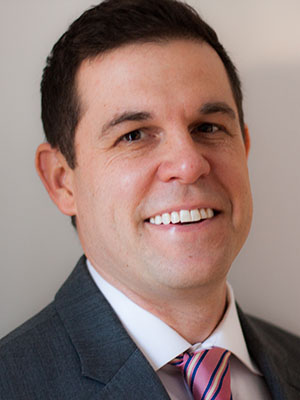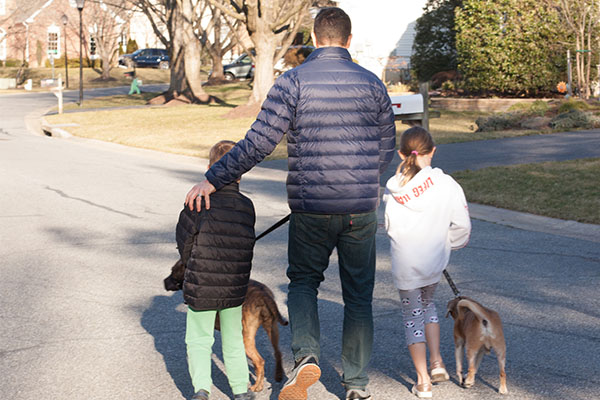Sense of responsibility guides alumnus into federal career
Stephen Ravas is on the front lines of oversight and accountability in Washington.
A native of the nation’s capital, Stephen H Ravas returned to Washington, D.C., from Detroit early in his career and planted his roots.

The 2005 Wayne Law graduate is counsel to the inspector general for the Corporation for National and Community Service Office of Inspector General (CNCS-OIG). This is the federal agency that engages Americans in service and volunteerism in the United States though its grant-making efforts and is home to programs like AmeriCorps.
Each federal agency’s office of inspector general is responsible for preventing and detecting fraud, waste, abuse and mismanagement in the agency’s programs and operations, and Ravas is involved in almost every aspect of that work.
“The CNCS awards over $750 million in federal grants to improve lives and strengthen communities through volunteerism,” Ravas said. “That is a lot of money going to grantees and subgrantees in communities across the country for community service. Even though the purpose of CNCS’s grant funding is noble, there are organizations and individuals who are not good stewards of our federal funds.”
Ravas always knew he wanted to work for the federal government, but it was just a matter of when and where he should go.
“I grew up understanding the value of government services. Both of my parents retired as federal government employees, and my younger brother currently has over two decades of federal service,” Ravas said. “My father [Theodore Ravas ’68] worked as an attorney for three different government agencies over his career, including enforcing desegregation laws in various school districts in the southern United States.
“The federal government also brought my parents together,” he continues. “My mother and father met while working at the same federal agency. They took pride in their jobs and instilled in me a responsibility to give back.”
Attending law school wasn’t always on Ravas’ radar, though. As a child, he told himself he didn’t want to be an attorney and chose to pave his own path.
After earning a psychology degree from James Madison University, Ravas entered the workforce and found himself “gravitating toward the legal” aspects of his job. During this time, he says he allowed himself to focus on “professional self-reflection” and eventually knew law school was his next step.
Ravas felt a pull toward Wayne Law since both his father and aunt, Andrea Ravas ’82, were alumni and he had extended family in metro Detroit. He said he was very impressed with the Law School on his initial tour.
“The school was financially appealing, even for an out-of-state student, and I was intrigued by its Midtown location and the legal pipeline to the local firms, county and federal courts, and large businesses,” Ravas said.
“On the first day of Law School orientation, when Legal Writing Instructor Amy Neville taught to my section how to IRAC, I knew that law school was where I wanted to be,” Ravas added.
After commencement, Ravas clerked for the Hon. Paul D. Borman of the U.S. District Court for the Eastern District of Michigan for two years. In 2007, he landed a job as an associate at Cadwalader, Wickersham & Taft LLP that brought him back to his home of Washington, D.C.
Ravas worked for Cadwalader for eight years and was a member of the firm’s White Collar Compliance Group. He worked with foreign and domestic clients on a wide array of legal and compliance issues ranging from criminal investigations and prosecutions to civil litigation and enforcement actions.
“At the law firm, I saw a number of colleagues who burned themselves out and were generally unhappy campers,” Ravas said. “That observation and others like it led me to this conclusion: Find something you love to do and commit to it, but remember that personal growth is just as important as professional growth.”

This mindset led Ravas to start a rewarding career within the federal government. He also had a growing family, so he knew it was the perfect time to make the transition.
In 2015, he joined the U.S. Department of Commerce Office of Inspector General and spent time as a detailee with the Criminal Division of the U.S. Attorney’s Office for the Eastern District of Virginia as a special assistant U.S. attorney. He then went on to work at the U.S. Department of Homeland Security Office of Inspector General before joining CNCS-OIG in the fall of 2019.
Ravas believes the best part of his job as the primary legal advisor for CNCS-OIG is working with exceptional individuals who care about the organization’s mission.
“The OIG’s mission is special: In addition to detecting and deterring fraud, waste and abuse, we are tasked with promoting economy, efficiency and effectiveness in the administration of our agency’s programs and operations,” Ravas said. “The work we do protects public funds and helps the agency identify better ways to care for those funds.
“I am on the front lines of oversight and accountability,” he continued, “and at the end of the day, I am proud of CNCS-OIG’s work.”
7 questions with Stephen H Ravas
Q: Who are some of your role models and why?
A: Personally, my parents are role models. My mom stayed home with my brother and me full-time when we were little. We were a handful and it could not have been easy, but she did it with such grace. When we were old enough, she reentered the workforce. I am sure it was difficult to restart your career after a 10-12 year absence. My dad instilled values in me like loyalty, integrity, ownership and dedication. He also taught me why government service is important and that it is important to find your purpose in life.
One of my professional mentors is former Wayne Law Dean James (Jim) K. Robinson. Prior to his passing, Jim had a storied career both with the government and in the private sector, and he took a chance hiring a recent law school graduate who wanted to return to D.C. and work for a law firm. He was an understanding and patient colleague, taking the time to work with you to ensure you were doing your absolute best work. Jim was one-of-a-kind, and one of a few individuals who helped start my career and shape my professional self. I’m also proud to help continue his legacy by giving back to Wayne Law through the James K. Robinson Endowed Scholarship Fund.
Another mentor of mine is Hon. Paul D. Borman, a man whom I greatly respect and admire. My two-year clerkship with Judge Borman was the best job I’ve had in my career. A federal judicial clerkship is a wonderful experience for many reasons, but one important aspect is that it prepares you to distill information regarding many different areas of law. That skill is an asset in my current position.
Q: What lessons have your work life taught you?
A: A valuable lesson I learned early in my career is that time management is a necessity. In the government, that skill is more important because you have to do more with less. Another lesson I learned is that you must have a work-life balance. A healthy work-life balance will make you a happier, more productive work citizen.
Q: Do you have any favorite stories from your career thus far?
A: My job at the firm required me to travel internationally. I traveled to many places that I may not have had the opportunity to visit that early in life. I saw London and Paris multiple times, Istanbul, Copenhagen and Amsterdam, to name a few. In fact, I loved Paris so much that I planned a few days there for my honeymoon.
Q: What was your first impression of working in the nation’s capital?
A: I am from the D.C. metro area, so the nation’s capital is not new to me. However, when I moved from Michigan to D.C. to work at the firm, I ended up living in downtown D.C. for the first time. The Washington Mall was a block from my apartment, which put me in close proximity to many of the monuments. I would jog past the capitol, the Washington Monument, the Lincoln Memorial and others on a regular basis. I often ended my run at the National Archives where I would view the Declaration of Independence, the Constitution and the Bill of Rights. It was surreal. I felt connected to the government and the city in a way that I had never felt before. I also quickly recognized that D.C. has many, many tourists.
Q: What are some of your most memorable experiences from your time in law school?
A: I have a great memory of Professor Robert A. Sedler’s Constitutional Law 2 class. It was Sedler’s preference to call upon a student for the entire class period and his class was purely Socratic. In that particular class, I was selected randomly and asked to discuss the cases regarding the regulation of sexually oriented businesses (e.g., time, place and manner, and the First Amendment). In that class, on that day, I learned the most I have ever learned in any one class period. It was an amazing experience. He grilled me and it was entertaining at the same time, but not at my expense. That class stands alone as the only class period that I remember from my time at Wayne Law. Professor Sedler is world-class.
I also cherish the lifelong friendships I gained — I am the godfather to the daughter of one of my classmates and her husband.
Q: What do you do in your spare time?
A: I have two children in elementary school that keep my wife and I occupied. We also recently added a second dog to the family. Spare time is in short supply, but when I can, I enjoy attending Washington Nationals (World Champs!) games with my wife and playing lawyer league softball.
Q: Have you participated in any service projects? If so, where and what did you do?
A: It has been a while since I participated in a service project. However, I spent some time volunteering on a municipality’s Board of Zoning Appeals. In that capacity, I participated in hearings and decisions on all administrative appeals and applications for variances and special exceptions. It was an enjoyable experience and an interesting way to put to use what I learned in Professor John Mogk’s Land Use class.